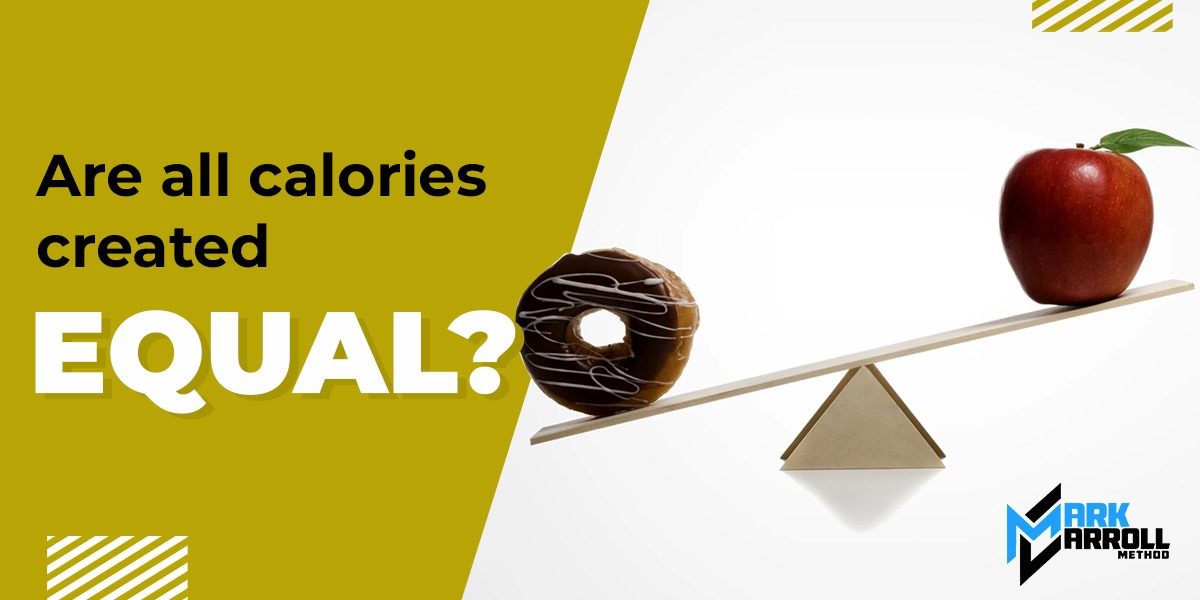Are all calories created equal?

What is a calorie?
A calorie isn’t a physical substance like water or juice. But, just like centimetres and litres, a calorie is a unit of measure. More specifically, it is the amount of energy required to raise the temperature of one mL of water by one degree Celsius. The total amount of calories found in food is measured via a bomb calorimeter. This device measures the heat of a fuel sample when burned under stable temperature conditions to evaluate the calorie value. So technically, you could put wood in a bomb calorimeter and receive a ‘calorie’ value. The limitation is that humans can’t absorb calories and nutrients from wood (obviously), so many argue that calorie tracking isn’t an efficient means to lose fat because ‘not all calories are created equal’.
The Calorie has been used to describe the energy content of food for hundreds of years. Likewise, the energy cost of exercise has also been measured via calories. If you’re not new here, you’ll know that Mark (and I) have repeated time again that to lose fat, you need to burn more calories than your body needs. And if you don’t believe us, then believe the law of thermodynamics, which states that energy can neither be created nor destroyed – only converted from one form of energy to another.
But is it fair to say that not all calories are created equal?
A calorie is a calorie is a calorie, at least from a thermodynamic standpoint. Why? Because a calorie is a unit of measure.
Now, does that mean that we all absorb the same amount of energy from foods?
No!
A great example of this is found in the almond. Due to almonds’ natural cellular structure, we may absorb fewer calories than is displayed on the label. Another example is in resistant starch and insoluble fibre. Studies have shown that energy absorbed from these foods varies among individuals.
So, does that mean that energy balance is a lie?
No!
The amount of energy that we truly absorb from food is questionable. You only have to look at a person with uncontrolled Crohns disease or a coeliac who is eating gluten to realise that food absorption is not simple. But no one (at least those who understand science) is questioning that a bomb calorimeter indicates that if x = y calories, then you will absorb z calories. No, calories are simply the unit of measure. Energy balance is the difference between the energy you absorb and the energy you burn. Whether you absorb 100% of the calories found in almonds or 70%, you are eating (absorbing) your maintenance calories if you maintain your weight. If you lose fat, you are eating (absorbing) fewer calories than you burn. And if you are gaining fat, you are eating (absorbing) more calories than your body burns.
So, what happens when we eat calories? Where do they go?
I will skip a few steps otherwise, this will turn into a novel. For simplicity, let’s say that your food isn’t ‘inside’ your body until it passes your intestinal lining. Meaning that the calories derived from food aren’t absorbed by your body until then. But once the food is inside your body, you will do one of three things with it:
- Use it
- Get rid of it
- Store it
How do we use it?
Your body will use glucose and fatty acids to produce adenosine triphosphate (ATP), which is your body’s primary energy source. What isn’t converted to ATP will be converted to carbon dioxide and water. Now, amino acids can also be used to produce ATP (amino acids do many crazy and beautiful things, but I won’t go into that here). ATP is required to make your body function and is used up in this process. Then, suppose you have a shortage of a specific macronutrient (because they all play an essential role). Your body will synthesize them via processes like gluconeogenesis (to create glucose) and de novo lipogenesis (to produce fatty acids and protein).
How do we store it?
Simply put:
- Amino acids are used to build or repair proteins.
- Glucose is stored as glycogen.
- Free fatty acids will be packaged into triglycerides and transported to your muscles and fat cells (this is how we gain fat) to be stored intracellularly or extracellularly.
How do we get rid of it?
This is in the context of losing fat. Have you ever stopped to wonder what happens to that fat we lose? Does it just disappear? If we go back to the law of thermodynamics (energy cannot be used or destroyed), then the simple answer is no. So what happens to lost fat? It’s breathed out as CO2 or urine – pretty cool, right?
Yours in health,
Sheridan Skye
Head of Nutrition







